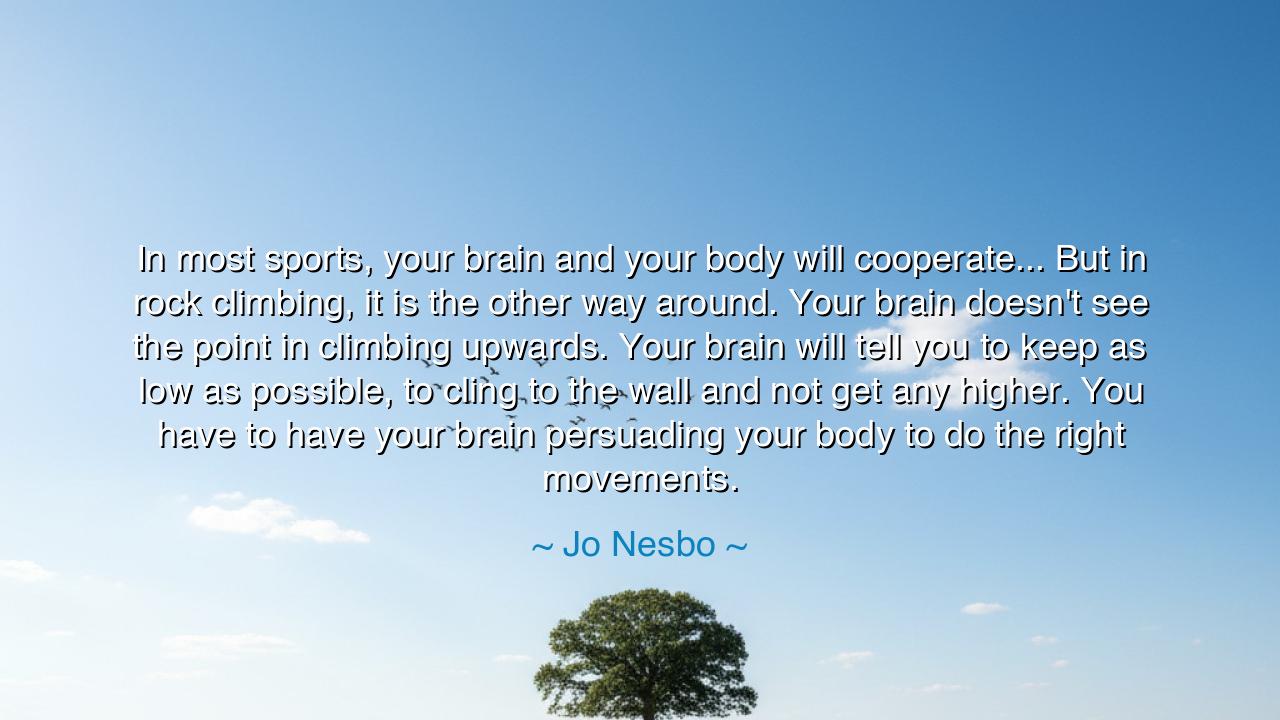
In most sports, your brain and your body will cooperate... But
In most sports, your brain and your body will cooperate... But in rock climbing, it is the other way around. Your brain doesn't see the point in climbing upwards. Your brain will tell you to keep as low as possible, to cling to the wall and not get any higher. You have to have your brain persuading your body to do the right movements.






"In most sports, your brain and your body will cooperate... But in rock climbing, it is the other way around. Your brain doesn't see the point in climbing upwards. Your brain will tell you to keep as low as possible, to cling to the wall and not get any higher. You have to have your brain persuading your body to do the right movements." Thus spoke Jo Nesbo, writer and climber, whose words strike with the clarity of a hammer upon stone. He reveals here the unique paradox of rock climbing, that unlike other disciplines where mind and body move as allies, this one requires a dialogue of conflict, a negotiation between fear and will, between instinct that seeks safety and vision that seeks ascent.
In most contests—be it running, swimming, or wrestling—the body burns to exert, and the brain provides tactics, rhythm, or restraint. They labor together for victory. But upon the cliff face, this harmony is shattered. The brain, servant of survival, whispers its warning: "Do not ascend. Stay low, stay safe, cling to the wall." It measures height and risk, and in its primal wisdom it counsels retreat. Yet the climber seeks the summit, and so the brain must be turned against itself, re-trained not to preserve comfort, but to pursue glory.
This struggle between fear and resolve echoes through history. Consider the tale of Hannibal crossing the Alps. His soldiers, staring at the snow-choked passes, felt their minds rebel against the command to go upward. Instinct called them to turn back, to remain low in the valleys where survival seemed more certain. Yet Hannibal, like the climber, persuaded not only his men’s bodies but their very minds to obey a vision higher than fear. It was not instinct, but conviction, that carried elephants and warriors over the impossible mountains.
In this way, climbing is not merely a sport, but a metaphor for the human condition. For how often does the brain, enslaved by comfort and fear, command us to stay low? How often does instinct whisper, "Do not risk, do not rise, cling to what you know"? And yet, the soul longs for ascent—for the higher vantage, the summit beyond danger, the vision that cannot be seen from the valley. Like the climber, we must learn to persuade the brain to obey something greater than instinct: the call of destiny, the command of vision.
The wisdom here is not to despise fear, but to understand it. Fear is the guardian of survival, the protector of the flesh. But if listened to alone, it becomes a jailer, chaining us to mediocrity. The climber honors fear, but does not kneel to it. Instead, he harnesses it, using it as a spur to precision and care, even as he overrides its counsel with determination. True courage is not the absence of fear—it is the mastery of fear by the higher will.
The lesson is clear: in life, as in climbing, there will be times when your instincts and your ambitions are at war. You must learn to be both persuader and warrior, to train your mind not merely to preserve your life, but to elevate it. Recognize when fear is wisdom, and when fear is chains. Teach your brain to support the movements of your spirit, even when the climb seems irrational. For it is in the act of rising that we discover the horizons hidden from the valley.
Practical action follows. When faced with a challenge that fills you with dread, pause and acknowledge the voice of fear. But then, ask a higher question: what lies beyond this wall, beyond this ascent? Begin with small climbs—tasks that train your mind to act in defiance of its own resistance. Build the habit of persuasion, until the brain becomes not only a voice of caution but also a servant of courage.
Thus Jo Nesbo’s words endure as a teaching: life itself is a climb, and the greatest summits are reached not when brain and body act in easy harmony, but when the mind conquers its own fear and commands the body upward. The wall is before you, the valley behind you—listen to fear, but follow vision. For the summit belongs to those who persuade themselves to rise.






AAdministratorAdministrator
Welcome, honored guests. Please leave a comment, we will respond soon